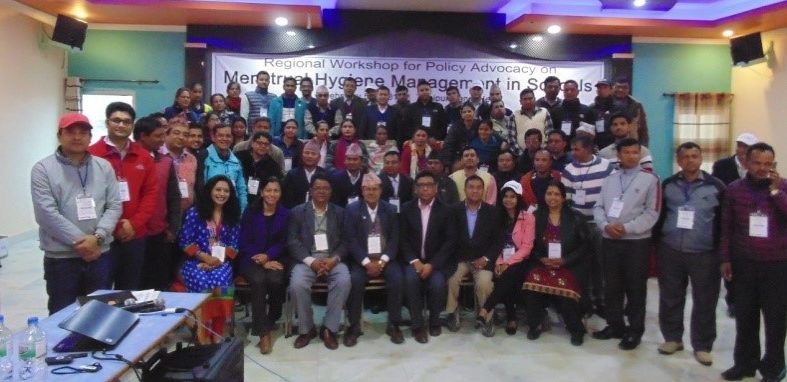
Menstrual hygiene management (MHM) is a challenge in Nepal. Traditionally, women are not allowed to perform certain activities during menstruation such as touching senior family members and entering and praying in the temple. Talking about menstruation is taboo in Nepalese society, even between mothers and their girls. Lack of appropriate sanitary installations at homes, but also in schools, hospitals and public places makes it difficult for women to manage menstruation hygienically. Nepal Government’s National Sanitation and Hygiene Master Plan has identified and addressed the need of including MHM facilities in schools, however this Master Plan has not yet been enforced.
In line with SDG target 6.2, Swiss Water and Sanitation Consortium partner organizations are promoting MHM in schools. The program includes MHM training for girls and teachers, sanitary pad supply in schools, and incinerators in school toilets for safe waste disposal. Under the Consortium's Global Advocacy Fund, three Consortium organizations joined forces to advocate for MHM in Nepal and organized a Regional Workshop on MHM in Dang on 5-6 February 2017 in collaboration with the Regional Water, Sanitation and Hygiene Coordination Committee of the Mid-Western Region. The overall objective of the workshop was to advocate for good MHM practices in school to the relevant authorities and to develop a draft advocacy strategy for MHM in Nepal. Representatives from different governmental organizations such as Ministries of Health and Education, I/NGOs, schools and communities joined the workshop. There were a total of 82 participants from 18 districts, all of them working on menstrual hygiene management.
At the end of the workshop, the 'Dang Declaration Paper 2073' with 15 key points for effective MHM was drafted based on key messages and conclusion of the two days' workshop. The draft was presented to the participants for feedback, finalized, and approved by all participating organizations. All governmental and non-governmental organization/ institutions officials and stakeholders present at the workshop commit towards the implementation of 'Dang Declaration Paper 2073' drafted as part of the Regional Workshop in coordination with Regional level Water Sanitation and hygiene Coordination Committee (R-WASH-CC) . The Dang Declaration was presented at the subsequent national MHM workshop in February 2017, organized by the Ministry of Water Supply and Sanitation, in collaboration with Water Supply and Sanitation Collaborative Council (WSSCC) and Consortium partners. The Dang Declaration was taken up and now serves as basis to develop a national policy on MHM.
The regional workshop of Dang created great momentum to discuss MHM openly between Government Organizations, I/NGOs, Community Organizations and beneficiaries. This event with regional and national focus raised awareness among government officials and led to immediate action such as the formation of MHM Practitioner Alliance, conduction of various MHM related campaigns, and drafting of MHM related national policy. Thanks to the MHM advocacy, MHM infrastructure projects such as gender friendly toilets and water access in schools can now be realized. Continuous joint effort of all stakeholders is needed to complete MHM projects, address the existing gaps in MHM in Nepal and drive MHM policy on national level, in order to improve living conditions and rights of Nepalese women and girls in the long run.
The Dang Declaration Paper can be found here.
Fig 1: Participants of the Regional Workshop for Policy and Advocacy on Menstrual Hygiene Management in Schools
